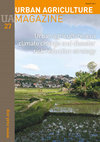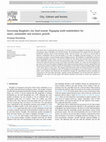Papers by Piyapong Boossabong
Policy Press eBooks, May 22, 2023
Policy Press eBooks, May 22, 2023
SEACE Official Conference Proceedings
Research Handbook of Policy Design, 2022

The Oxford Handbook of Deliberative Democracy
Deliberative policy analysis has its origins in the argumentative turn in policy analysis. It eme... more Deliberative policy analysis has its origins in the argumentative turn in policy analysis. It emerged as an alternative to the use of standard empirical-analytic methods of the social sciences to solve public policy problems. Not only has the conventional neopositivist approach failed to produce the promised results, it has generally operated with a technocratic, and largely an anti-democratic, bias. Basic to deliberative policy analysis is a method for bringing together a wider spectrum of citizens, politician and experts in the pursuit of policy decisions that are both effective and democratically legitimate. This chapter begins with an outline of the theoretical perspectives underlying deliberative policy analysis. Then, the process and practice is illustrated by the case study, which shows how the approach has moved from a theory to a practical method for policy decision-making.
Journal of Asian Public Policy
This study examines the state and development of public policy education in Thailand, including i... more This study examines the state and development of public policy education in Thailand, including its dynamics over time, its institutional setting, and emerging forces acting upon it. It focuses on policy educational institutions, policy courses offered in universities, and national socio-political contexts that shape the academic profession. Policy education has heavily been developed and taught as a subset of public administration with predetermined specifications. However, it has potential to be an independent field. This study fills a notable research gap, as the topic has been largely neglected in international publications, especially works concerning the internationalization of policy education.

Critical Policy Studies
ABSTRACT This article addresses the higher education landscape in Thailand and links educational ... more ABSTRACT This article addresses the higher education landscape in Thailand and links educational commercialization to the changes in Thai higher education. It provides the concrete ways in which educational commercialization manifests itself in higher education through public policy. It also explains policy impacts on educational commercialization in this country by analyzing the shorter- and longer-term ramifications of these changes in Thai higher education including tensions, conflicts, and long-term effects. The article argues that privatization and quality control of the universities are policy instruments that activate neoliberal transformation. The higher education is now not sensitive to structural inequality and perceives knowledge as how-to-do-something in highly competitive economic world. The universities provide mainly technical knowledge which is produced by hegemonic public agencies and corporations rather than to play a role in leading the creation of knowledge.
Routledge Handbook of Urbanization in Southeast Asia, 2018
Cities in Asia by and for the People, 2018

This book examines the active role of urban citizens in constructing alternative urban spaces as ... more This book examines the active role of urban citizens in constructing alternative urban spaces as tangible resistance towards capitalist production of urban spaces that continue to encroach various neighborhoods, lanes, commons, public land and other spaces of community life and livelihoods. The collection of narratives presented here brings together research from ten different Asian cities and re-theorises the city from the perspective of ordinary people facing moments of crisis, contestations, and cooperative quests to create alternative spaces to those being produced under prevailing urban processes. The chapters accent the exercise of human agency through daily practices in the production of urban space and the intention is not one of creating a romantic or utopian vision of what a city "by and for the people" ought to be. Rather, it is to place people in the centre as mediators of city-making with discontents about current conditions and desires for a better life.

Field Actions Science Reports. The journal of field actions, 2014
Urban and peri-urban agriculture is considered as a strategy that can bring multiple benefits and... more Urban and peri-urban agriculture is considered as a strategy that can bring multiple benefits and help to build resilient urban food systems at the city region level. Cities have an important role to play in climate change mitigation and adaptation, disaster risk management and in enhancing the climate resilience of their vulnerable residents. Major emitters of greenhouse gas (GHG), cities are not only contributing to climate change, but are also directly and indirectly impacted by it. Acute or chronic climate change is threatening access to basic urban services such as water, energy and food for growing populations. Key issues include rising temperatures, increasing rainfall, flooding and urban food insecurity. Rapid urban growth will only increase the number of highly vulnerable urban communities, with the urban poor being most at risk. Only with a coordinated approach and action at the global, regional, national and local levels can the climate change emergency be curbed, and its...

Boossabong addresses how policy network on urban agriculture develops collaborative governance me... more Boossabong addresses how policy network on urban agriculture develops collaborative governance mechanisms to cope with the disruption of food distribution caused by the floods. This chapter examines the extent to which such mechanisms enhanced resilience and environmental justice in a time of crisis. By adopting Habermasian perspectives, the chapter argues that deliberation between policy network members and flood victims determines meaningful collective actions that enhanced the resilience of the victims and promotes fair distribution, political and cultural recognition and parity of participation. Deliberation allows victims to raise their voices to reveal their resilience through their capacity to self-organize the external support and to address their sense of justice. Consequently, resilience and justice discourses are constructed and practiced by the policy network members and victims.

Critical Policy Studies, 2020
ABSTRACT By learning from haze pollution policy in Chiang Mai, Thailand, the policy intervention ... more ABSTRACT By learning from haze pollution policy in Chiang Mai, Thailand, the policy intervention discussed here is based on blaming rural farmers as a cause of the problem. The main policy instrument, thus, is to prohibit farmers from burning. Scientists point out that this complex problem is related to climate change, however, there is little focus on individual contributions to the problem. People find it more convenient to watch governmental agencies victimize farmers, since such a manipulation of the truth is politically and socially constructed. This challenge derives from the fact that some facts are perceived when making a policy, while some are ignored. Also, some facts are selected when evaluating a policy, while others are not. This article claims that joint-fact checking can help us to cope with the challenge when it operates through a deliberative process in which both empirical and normative assumptions are included.

City, Culture and Society, 2018
This article aims to understand the governance of city food systems in Bangkok by drawing attenti... more This article aims to understand the governance of city food systems in Bangkok by drawing attention to: the participatory aspect of Bangkok's city food governance; the food production that emerges from the sustainable growth and inclusive nature of this governance system; and civil society's use of this as an activism able to empower communities and for such movements to be smart in bridging territorial divisions, by way local government strategies, secured through capacity-building exercises. The multitude of stakeholders involved in governing Bangkok's food system is not just interrelated , but also linked and connected from top-to-bottom. These stakeholders include central and local governments, large food corporations, civil society organizations and even the daily life practices of street food venders and mobile markets. As a result, the article suggests, the governance of the city food agenda in Bangkok is both empowered and participatory, because organizations from the top and the middle are unable to sustain the development of food systems without including ordinary people in the actions taken to create them. This suggests legal frameworks, plans and related infrastructure development, are insufficient for Bangkok be smart in sustaining the development of cities food systems. As while the public sector facilitates food production and distribution through the regionalization process (including the conservation of the peri-urban agriculture, irrigation systems development, and central fresh food markets establishment), the smart city food agenda still requires operations from below to sustain such technical innovations.
Journal of Comparative Policy Analysis: Research and Practice, 2017
This essay aims to compare the roles of different forms of knowledge in analysing public policy i... more This essay aims to compare the roles of different forms of knowledge in analysing public policy in Thailand. It reveals that modern policy studies in Thailand were introduced during the Cold War. "Public policy" became a subject for teaching to policy makers, with studies in this area influenced by American universities. However, the roles of local knowledge and spiritual leaders have shown themselves to still be very important. To espouse different forms of knowledge, Thailand needs to call for more collaborative leaders, policy analysts and think tanks that go beyond taking a critical attitude to policy technocrats and challenging local knowledge.
Regular Issue
This article presents the case of policy deliberation on disaster coping strategies in Bangkok, T... more This article presents the case of policy deliberation on disaster coping strategies in Bangkok, Thailand. It demonstrates the challenges scientists faced when they sought to influence policymaking on flood mitigation. The article demonstrates different forms of knowledge that shaped Bangkok’s flood policy, and explains how lay knowledge promoted by farmers, local communities, and Buddhist monks were successful in persuading policymakers and the wider public in their preferred policy option. Meanwhile, scientific knowledge failed to make their case in public forums, and on some occasions, even alienated Thai citizens. The article concludes by drawing lessons on how scientific and lay knowledge can better contest as well as connect their claims to enrich the process and outcomes of public deliberation on disaster coping policy.
Journal of Asian Public Policy, 2021











Uploads
Papers by Piyapong Boossabong
2. นโยบายศึกษาในมุมมอง Welfare Economics: ศึกษานโยบายในฐานะการสร้างความเป็นอยู่ที่ดีของสังคมส่วนรวม
3. นโยบายศึกษาในมุมมอง Public Choice และ Behavioral Economics: ศึกษานโยบายในฐานะของแนวทางการปรับเปลี่ยนพฤติกรรมของปัจเจก
4. นโยบายศึกษาในมุมมอง Information Processing/ Data Analytics: ศึกษานโยบายในฐานะของการตัดสินใจบนฐานของข้อมูลสนับสนุน
5. นโยบายศึกษาในมุมมอง Social Structure: ศึกษานโยบายในฐานะกลไกภายใต้โครงสร้างสังคมที่สลับซับซ้อน
6. นโยบายศึกษาในมุมมอง Management: ศึกษานโยบายในฐานะเครื่องมือการบริหารจัดการ
7. นโยบายศึกษาในมุมมอง Political/policy Process: ศึกษานโยบายในฐานะส่วนหนึ่งของกระบวนการทางการเมือง
8. นโยบายศึกษาในมุมมอง Comparative Politics/ Public Policy: ศึกษานโยบายในฐานะบทเรียน (ที่ดี) จากที่อื่น
9. นโยบายศึกษาในมุมมอง Political Philosophy/ Thoughts/ Theories: ศึกษานโยบายในฐานะเส้นทางสู่การสร้างสังคมการเมืองที่ดี
10. ทำไมต้องมี “School” ด้านนโยบายสาธารณะ?
2.การวิเคราะห์ต้นทุน-ผลตอบแทนหรือสิ่งที่เสียไป-สิ่งที่ได้มา (Cost-benefit analysis)
3.การวิเคราะห์ระบบพลวัต (System dynamics)
4.การวิเคราะห์ผู้มีส่วนได้ส่วนเสีย (Stakeholder analysis)
5.การประยุกต์ใช้ทฤษฏีเกม (Game theory)
6.การวิเคราะห์เชิงยุทธศาสตร์ (Strategic analysis)
7.การสร้างอนาคตภาพหรือฉากทัศน์ (Scenario building): เดลไฟ (Delphi) และการวิเคราะห์แมทริกซ์ผลได้ผลเสีย (Pay-off matrix)
8.การติดตามและประเมินผล (Monitoring and evaluation)
9.การวิเคราะห์เครือข่ายนโยบาย / แผน (Policy network analysis)
10.ถึงเวลานับรวมเครื่องมือ “แบบที่ไม่ใช่” เชิงเทคนิค? : แนะนำการวิเคราะห์เชิงวิพากษ์และตีความ (Critical and interpretive analysis)
11.แนวโน้มการวิเคราะห์นโยบายสาธารณะและการวางแผนยุคใหม่